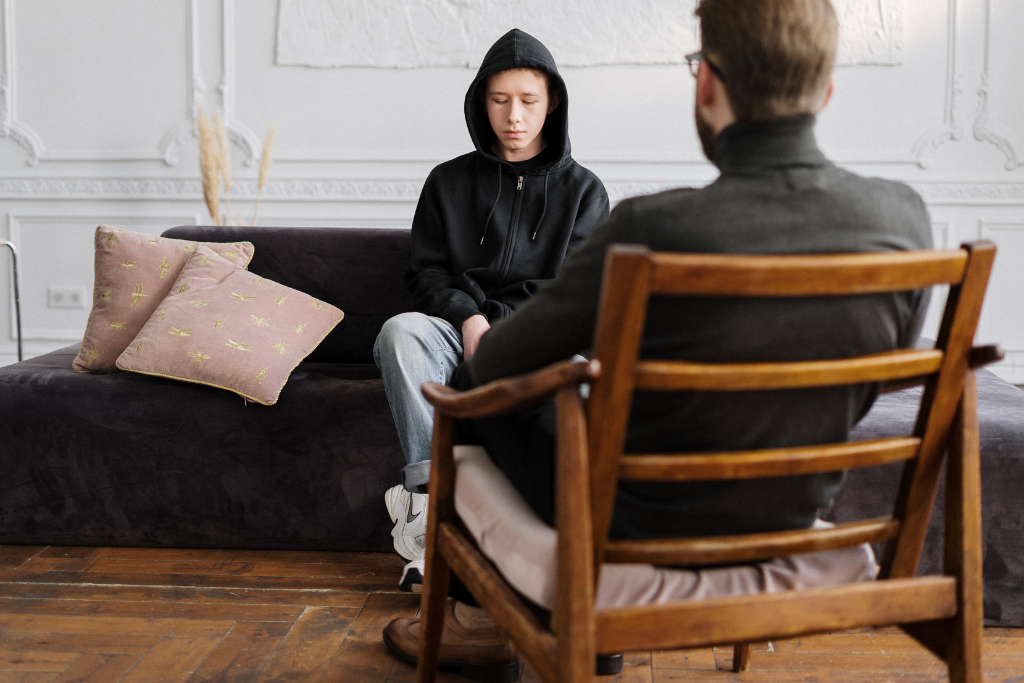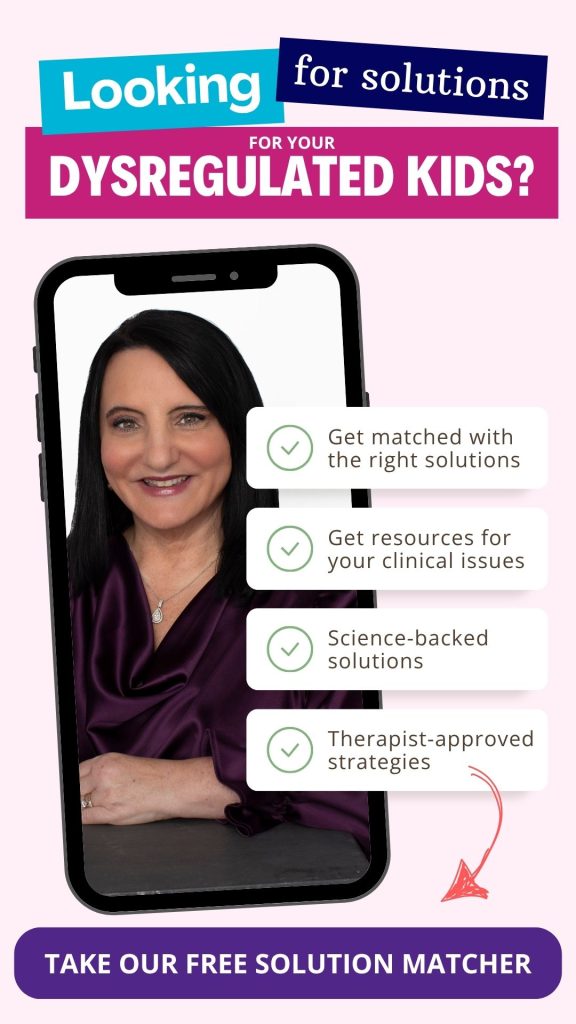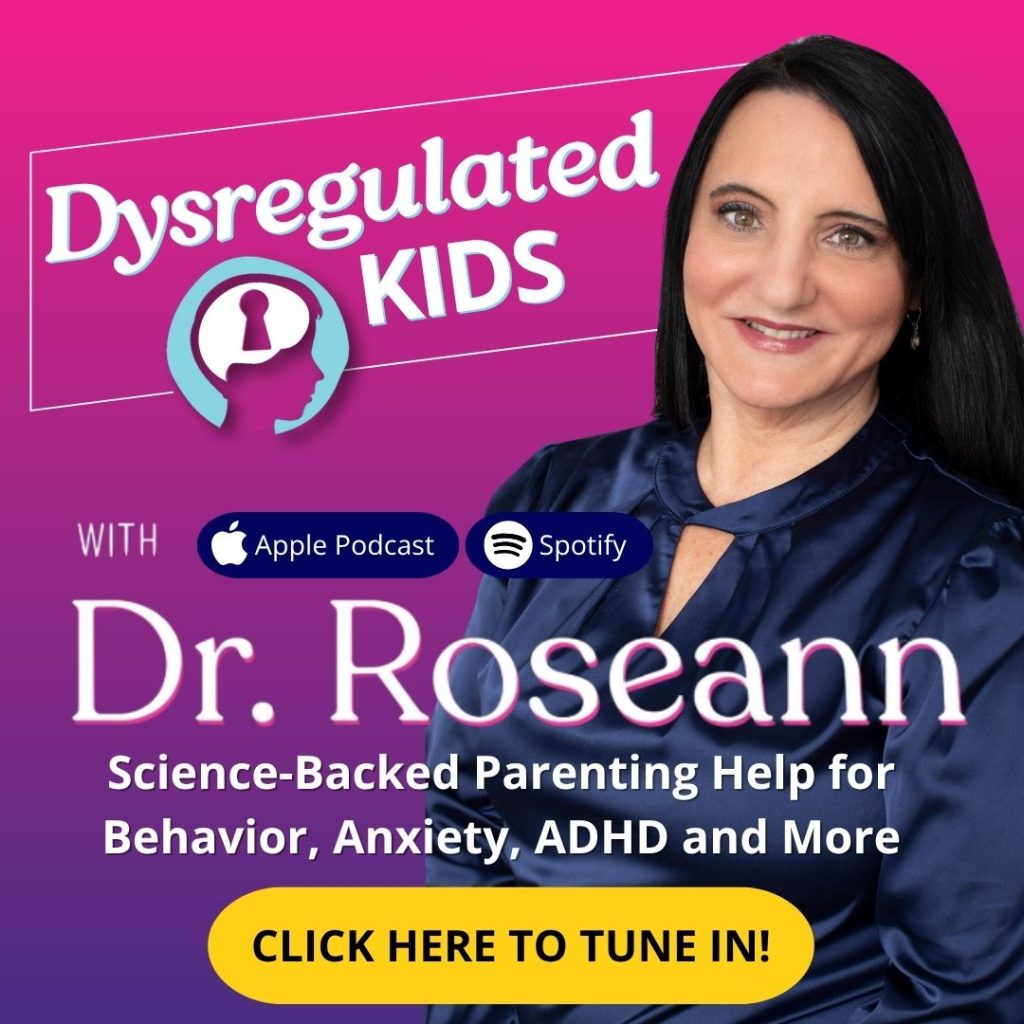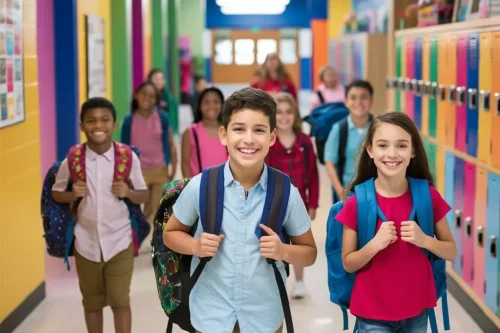Estimated reading time: 8 minutes
If your teen’s ADHD feels like it’s running the show—late nights, missing homework, endless arguments—you’re not alone.
Millions of parents face the same daily battles, and it isn’t because you’ve failed. It’s because a dysregulated brain makes it nearly impossible for your teen to focus, plan, or manage big emotions.
As both a clinician and mom, I want you to know there’s hope. With the right science-backed strategies, your teen’s brain can get calmer. Their confidence can grow, and school (and home) life can feel less like a battlefield.
In this article, we’ll walk through how teenagers can cope with ADHD in real, everyday ways. We’ll focus on routines, supports, and regulation-first tools that actually work.
How A “Regulation-First” Plan Help a Teen With ADHD?
When a teen’s nervous system is dysregulated, learning and self-control are offline. Regulate. Connect. Correct.™ is our simple, repeatable sequence: calm the brain, connect emotionally, then teach the skill.
Doable Daily Flow
- Regulate (2–5 min): 4-7-8 breathing, wall push-ups, short walk, or a 90-second cold water face splash.
- Connect (1–2 min): “I can see how tough this feels. I’m here.” Co-regulate with slow voice and breathing.
- Correct (5–15 min): One micro-skill: planner check, 15-minute time block, or a clear boundary: “Phone charges in the hallway at 9:30.”
Parent story:
Maria’s 15-year-old, Leo, melted down nightly over homework. She started with two minutes of paced breathing (Regulate), validated his stress (Connect), then he chose one 15-minute task (Correct). Three weeks later, fewer blowups and more completed assignments.

How Your Teen Can Cope With ADHD At School Without Burn Out
School is an executive-function obstacle course. Make it easier to perform what your teen already knows.
Smart scaffolds that conserve brain energy
- One planner only (paper or app) + 2-minute backpack reset at day’s end.
- Seat & movement: Prefer front/side seating; quick hall walk between classes; discreet fidget.
- 504/IEP accommodations: Extra time, chunked deadlines, teacher check-ins, reduced multi-step load.
- Study sprints: 15-on/5-off cycles; start with the easiest win to build momentum.
Parent story:
Dina’s 16-year-old, Sam, studied for hours but bombed tests. Switching to 15-minute sprints, mapping steps on a whiteboard, and requesting chunked deadlines helped lower anxiety and stabilize grades.
Russell A. Barkley, PhD said, “ADHD isn’t a disorder of knowledge—it’s a disorder of performance.” External structure helps the brain do what it knows.
Daily Habits That Reduce Symptoms (And Those That Don’t)
Tiny routines change brain states. Consistency beats intensity.
Habits that help
- Exercise most days (20–30 min): Walk, swim, team sport, or bike ride—whatever your teen will do. Research links physical activity with improvements in inattention and hyperactivity/impulsivity in youth (Xie et al., 2021).
- Sleep hygiene: Fixed bedtime/wake time; dim lights after 9 PM; no phones in bedrooms.
- Steady fuel: Protein + fiber at breakfast, hydration, and predictable meals to prevent crashes.
- Mindfulness minutes: Two minutes of breathwork before homework; short body scan at lights-out.
Habits that hurt
- Late-night screens (wrecks sleep → worse next-day focus)
- Unstructured afternoons (idle time fuels impulsive choices)
- Ten different apps (choose one planner and one reminder system)
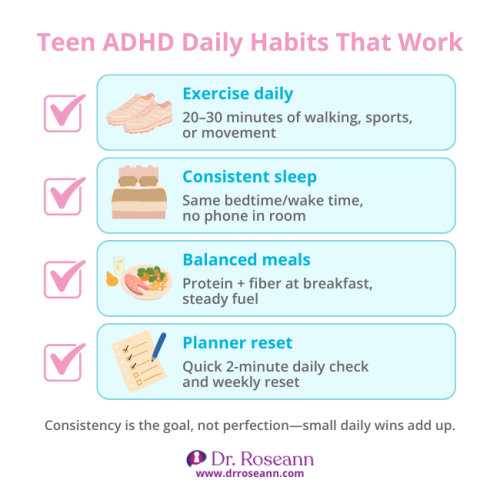
How To Build Organization Skills and Time Management in Teens
Teens don’t need more lectures. They need training and practice with tools that align with how their brains function.
OTP (Organization–Time–Planning) skills that generalize
- One home for papers: Labeled binder + weekly Sunday reset.
- 2-minute rule: If it takes under two minutes—do it now (file the handout, set the reminder).
- Time-blocking: Two to three 15-minute blocks per homework hour, with buffers.
- Weekly preview: Sundays—identify three micro-steps for the week’s biggest task.
Parent story:
Jayden (14) constantly lost assignments. A daily 2-minute backpack reset at the front door cut missing work in half within two weeks. Behavior is communication—and his backpack was “saying” he needed a system.
What Science Says
Parents deserve clarity, not jargon. Here’s what high-quality studies show:
- Targeted, skills-based therapy with parent involvement works. Programs blending motivational interviewing and parent-teen executive-skill coaching (e.g., STAND) improve performance and family conflict (Sibley et al., 2020).
- Group CBT without parents doesn’t add much. In an RCT, adolescent group CBT added to usual care showed no significant added benefit, highlighting the importance of the right format (Haugan et al., 2022).
- Movement is medicine. Regular physical activity is associated with meaningful improvements in core ADHD symptoms (Xie et al., 2021).
Margaret H. Sibley, PhD: “When teens help design the plan—and parents coach the skills—follow-through improves.”
How To Handle Peer Pressure, Screens, and Risky Choices
Teens with ADHD are more sensitive to peer approval and act faster on impulse. Scripts—not speeches—keep them safe.
Practical guardrails
- Screen plan: “Phone charges in the hallway at 9:30—non-negotiable.”
- Peer scripts: “No thanks, I’ve got practice early,” or “Not my thing—catch you later.”
- Micro-boundaries: Ride-share rules, shared locations, one check-in text when plans change.
- Replacement behaviors: When triggered—5 push-ups + water + outside air before replying to a tough text.
Parent story:
Arman (17) stayed up gaming. Moving the charger to the hallway, adding router timers, and offering an early run with Dad reduced conflict and improved morning mood.
Stephen P. Hinshaw, PhD: “Connection and clear expectations are the antidotes to risk.”
When To Get Professional Help and From Whom?
Start with school and expand as needed.
- School team: Ask the counselor, psychologist, and teachers for a 504 plan with extra time, chunked work, and teacher check-ins.
- Therapist: Choose one trained in teen ADHD. Look for behavior therapy with motivational interviewing and OTP (organization, time, planning) coaching.
- Medical provider: Review the pros and cons of the medication. Best results often come when meds are paired with skills training.
- Brain-based tools: Options like QEEG neurofeedback, CALM PEMF®, nutrition, sleep, and exercise all support regulation.
How To Protect Self-Esteem While Building Coping Skills
Years of trying and “failing” can fuel shame. Let’s rewrite the script.
Protect the bond; teach the skill
- Praise effort, not just grades: “You started without me asking—huge.”
- Co-create plans: “What’s the smallest next step you’re willing to take?”
- Normalize brains: “It’s not bad parenting—it’s a dysregulated brain. We’ve got tools.”
- Find the spark: Music, welding, coding—strengths drive motivation.
Moving Forward With Hope (and a Plan)
Parenting a teen with ADHD can feel overwhelming, but remember—you’re not fighting your child; you’re fighting dysregulation. When you calm the brain first, everything else gets easier.
Here’s the big picture: regulate → connect → correct. Build steady habits—study sprints, a single planner, quick backpack resets, and clear screen rules. Seek supports that include you, because parent involvement changes outcomes.
If you’ve been wondering how teenagers can cope with ADHD, start small. Take a 10-minute walk together after school, then do a 2-minute planner check at the kitchen table. These little rituals may not look big, but they rewire the brain over time.
You and your teen aren’t alone—and with the right tools, calmer days and more confidence are ahead.
FAQs
What study habits actually help high schoolers with ADHD?
Short 15-on/5-off study sprints, chunked tasks, and a single planner. Ask the school for 504 supports (extra time, check-ins).
How can I motivate a teen who “doesn’t care”?
Regulate first (snack + quick walk), then agree on one next step. Reward effort and consistency, not perfection.
Is exercise really worth the hassle?
Yes. Regular activity is linked with improvements in attention and hyperactivity/impulsivity (Xie et al., 2021). Start small and make it daily.
Does CBT help teens with ADHD?
Skills-based CBT with parent involvement is promising (Sibley et al., 2020). Group CBT without parents showed no added benefit in one RCT (Haugan et al., 2022).
Terminology
- Dysregulation: A revved-up or shut-down nervous system; focus and self-control are harder.
- OTP skills: Organization, Time management, Planning—habits that make school and life run smoother.
- 504 Plan: U.S. school accommodations that level the playing field (extra time, chunking, check-ins).
- Motivational Interviewing: A collaborative style where the teen helps design the plan, boosting follow-through.
Citations
Haugan, A.-L. J., Sund, A. M., Young, S., Thomsen, P. H., Lydersen, S., & Nøvik, T. S. (2022). Cognitive behavioural group therapy as addition to psychoeducation and pharmacological treatment for adolescents with ADHD: A randomized controlled trial. BMC Psychiatry, 22(375). https://doi.org/10.1186/s12888-022-04019-6
Sibley, M. H., Altszuler, A. R., Morrow, A. S., Merrill, B. M., Campez, M., Perez, A., Coxe, S., & Graziano, P. A. (2020). Effectiveness of motivational interviewing–enhanced behavior therapy (STAND) for adolescents with ADHD: A randomized community trial. Journal of the American Academy of Child & Adolescent Psychiatry, 59(1), 91–103. https://doi.org/10.1016/j.jaac.2019.01.011
Xie, Y., Gao, X., Song, Y., Zhu, X., Chen, M., Yang, L., & Ren, Y. (2021). Effectiveness of physical activity intervention on ADHD symptoms: A systematic review and meta-analysis. Frontiers in Psychiatry, 12, 706625.
https://doi.org/10.3389/fpsyt.2021.706625
Always remember… “Calm Brain, Happy Family™”
Disclaimer: This article is not intended to give health advice, and it is recommended to consult with a physician before beginning any new wellness regimen. The effectiveness of diagnosis and treatment varies from patient to patient and condition to condition. Dr. Roseann Capanna-Hodge, LLC, does not guarantee specific results.
Are you looking for SOLUTIONS for your struggling child or teen?
Dr. Roseann and her team are all about science-backed solutions, so you are in the right place!
©Roseann Capanna-Hodge

